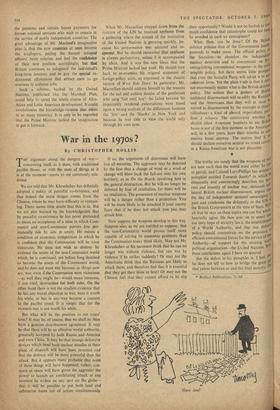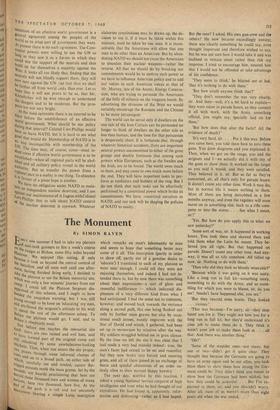War in the 197os ?
By CHRISTOTPHER HOLLIS Hr. argument about the dangers of war— concerning itself, as it does, with traditional pacifist theses, or with the state of things as it is at the moment—seems to me commonly mis- stated.
We arc told that Mr. Khrushchev has definitely adopted a policy of peaceful co-existence, and that indeed the main danger comes from the Chinese, whom he may have difficulty in restrain- ing. There seems little doubt that this is so. But we are also warned by the knowledgeable that by peaceful co-existence he has never pretended to mean an acceptance of a state in which Com- munist and non-Communist powers live per- manently side by side in amity. He means a condition of economic Competition in which he is confident that the Communists will be soon victorious. He does not wish to destroy by violence the assets of the non-Communist world which, he is convinced, are before long destined to become the assets of the Communist world, and he does not want war because, as things now are, war, even if the Communists were victorious —as well they might be—would mean immense, if not total, destruction for both sides. On the other hand there is not the smallest evidence that he has any moral objection to war, were it worth his while, or has in any way become a convert to the pacifist creed. It is simply that for the moment war is not worth his while.
But what will be the position in ten years' time? It may be, of course, that we shall by then have a genuine disarmament agreement. It may be that there will be an effective world authority, genuinely accepted by both Russia and America and even China. It may be that strange defensive devices which bend back nuclear missiles to their place of dispatch will have been invented and that the defence will be more powerful than the attack. But it appears more probable that none of these things will have happened; rather, con- quest of space will have given the aggressor the power to launch an annihilating attack at any moment he wishes on any spot on the globe— that it will be possible to put both land and submarine bases out of action simultaneously. If so, the arguments of deterrence will have lost all meaning. The aggressor may be deterred by the fear that a change of wind or a wind of change will blow back the fall-out over his own territory, as in On the Beach, involving him in the general destruction. But he will no longer be deterred by fear of retaliation, for there will be no retaliation. The possession of nuclear weapons will be a danger rather than a protection. You will be more likely to be attacked if your enemy fears that if he does not attack you you may attack him.
Now suppose the weapons develop in this way. Suppose also, as we are entitled to suppose, that the non-Communist world proves itself more capable of solving its economic problems than the Communists today think likely. May not Mr. Khrushchev or his successor think that he can no longer win without violence, but can win by violence if he strikes suddenly? Or may not the Americans think that the Russians are likely to attack them, and therefore feel that it is essential that they get their blow in first? Or may not the Chinese feel that they cannot afford to let slip lea, oaf tish their opportunity? Would it not be foolish to much confidence that catastrophe could for l be avoided in such an atmosphere?
What, then, can be done? Of the Bri defence policies that of the Government hardlY pretends to make sense. The official policy of the Socialists—to abandon the independent nuclear deterrent and to concentrate on fire' extinguishing conventional weapons—is the mast sen5ible policy, but there seems little prospect that even the Socialist Party will adopt it in a'1 coherent form. Yet the plain truth is that it does not enormously matter what is the British defence policy. The notion that a gesture of British unilateral disarmament will so edify the Russians and the Americans that they will at once he moved to disarmament by the example is clearly ridiculous—a kind of absurd imperialistic Pei' fism a rebours. The controversy whether we should allow American bombers to use British bases is not of the first moment as the American' will, in a few years, have their missiles in sah. marine bases anyway. The notion that if 'c should declare ourselves neutral we could survisc in a Russo-American war is not plausible.
tk
The truths are surely that the weapons of 0 are now such that the world must either be one or perish: and Colonel Lort-Phillips has written pamphlet entitled Towards Sanity* in which he eloquently and convincingly describes the h0r: rors and insanity of nuclear war, demands °ell; lateral British nuclear disarmament, argues that the day of independent national sovereign(/' is past and condemns the disloyalty to the UN of the British Government at the time of Suez. With all that he says on these topics one can but whole hcartedly agree. He then goes on to assert that our only hope of security lies iu the establishment of a World Authority, and that our defence i policy should concentrate on the provision °I efficient conventional forces for the service of Oslo Authority—of support for the existing w°,b political organisation—the Ur.itcd Nations. these conclusions again I have no quarrel. But the defect in his pamphlet is, I feel, (11 he does not tell us how to bridge the greatsP that yawns between us and this final security.
* Radical Publications, 2s. 6d
condition of an elective world government is a general agreement among the peoples of the World as to what sort of government they want. At present there is no such agreement. The Com- munist powers were willing to use the UN so 'Ong as they saw it .as a fpi um in which they could win the support of the neutrals and thus build up for themselves a majority against the West. It looks all too likely that, finding that the neutrals will not blindly support them, they will !IOW turn against the UN and that thus we shall be farther off from world unity than ever. Let us he that it will not prove to be so, that Mr. Khrushchev will be wise enough to understand the dangers and to be moderate. But the pros- pects are not very bright. At the most optimistic there is an interval to be tilled before the establishment of an effective havegovernment. What should be our policy havurttrInig that interval? Colonel I ort-Phillips would nave us leave NATO, but it is hard to see what good that would do. Membership of NATO is in niu°Way incompatible with membership of the '4. The time may, of course, come—must in- geed come if effective world government is to be established—when all regional pacts will be abol- ished and all military policy vested in the world authority. But ut to transfer the power from a regional pact to a reality is one thing. To abandon it Itfavour of a pious hope is another. lal"e, have no obligation under NATO to main- ta. In. an independent nuclear deterrent, and I am against our maintenance of it. I agree with Colonel i rt-Phillip o s that to talk about NATO control the nuclear deterrent is eyewash. Whatever
elaborate constitutions may be drawn up, the de- cision to use it, if it must be taken within five minutes, must be taken by one man. It is incon- ceivable that the Americans will allow that one man to be other than an Amman. But by aban- doning NATO we should not cause the Americans to abandon their nuclear weapons—rather the reverse. All that we should do by brcaking our commitments would be to destroy such power as we have to influence American policy and to add our voices to such American voices as that of Mr. Murray, late of the Atomic Energy Commis- sion, who are trying to persuade the Americans of the folly of reliance on the megaton bomb. By advertising the divisions of the West we would certainly encourage the Russians and the Chinese to be more intransigent.
The world can be saved only if dwellers on the one side of the Iron Curtain can be persuaded no longer to think of dwellers on the other side as less than human; and the time for that persuasion is desperately short. It is fortunate that, through whatever historical accidents, there are important neutral powers uncommitted to either of the great groups and doubly fortunate that among such powers white Europeans, such as the Swedes and the Irish, are to be found. The world owes much to them, and may come to owe much more before the end. They will have important tasks to per- form as mediators and holders of the ring. But I do not think that such tasks can be effectively performed by a committed power which broke its commitments. We have :onirnitted ourselves to NATO, and our task will be shaping the policies of NATO to sanity.











































 Previous page
Previous page